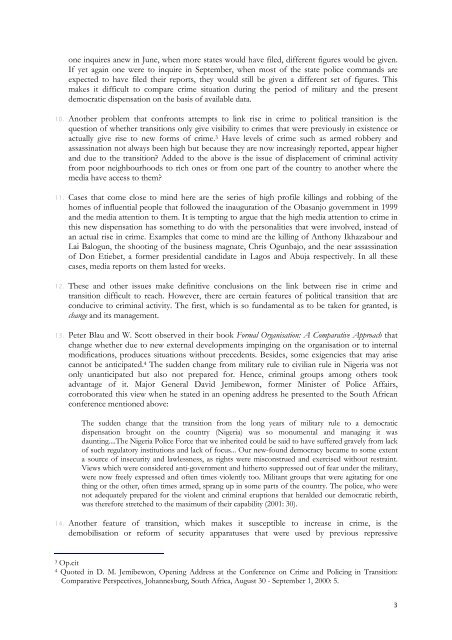114 - Nigeria - Crime and Human Rights Shettima, Kole - The ICHRP
114 - Nigeria - Crime and Human Rights Shettima, Kole - The ICHRP
114 - Nigeria - Crime and Human Rights Shettima, Kole - The ICHRP
You also want an ePaper? Increase the reach of your titles
YUMPU automatically turns print PDFs into web optimized ePapers that Google loves.
one inquires anew in June, when more states would have filed, different figures would be given.<br />
If yet again one were to inquire in September, when most of the state police comm<strong>and</strong>s are<br />
expected to have filed their reports, they would still be given a different set of figures. This<br />
makes it difficult to compare crime situation during the period of military <strong>and</strong> the present<br />
democratic dispensation on the basis of available data.<br />
10. Another problem that confronts attempts to link rise in crime to political transition is the<br />
question of whether transitions only give visibility to crimes that were previously in existence or<br />
actually give rise to new forms of crime. 3 Have levels of crime such as armed robbery <strong>and</strong><br />
assassination not always been high but because they are now increasingly reported, appear higher<br />
<strong>and</strong> due to the transition? Added to the above is the issue of displacement of criminal activity<br />
from poor neighbourhoods to rich ones or from one part of the country to another where the<br />
media have access to them?<br />
11. Cases that come close to mind here are the series of high profile killings <strong>and</strong> robbing of the<br />
homes of influential people that followed the inauguration of the Obasanjo government in 1999<br />
<strong>and</strong> the media attention to them. It is tempting to argue that the high media attention to crime in<br />
this new dispensation has something to do with the personalities that were involved, instead of<br />
an actual rise in crime. Examples that come to mind are the killing of Anthony Ikhazabour <strong>and</strong><br />
Lai Balogun, the shooting of the business magnate, Chris Ogunbajo, <strong>and</strong> the near assassination<br />
of Don Etiebet, a former presidential c<strong>and</strong>idate in Lagos <strong>and</strong> Abuja respectively. In all these<br />
cases, media reports on them lasted for weeks.<br />
12. <strong>The</strong>se <strong>and</strong> other issues make definitive conclusions on the link between rise in crime <strong>and</strong><br />
transition difficult to reach. However, there are certain features of political transition that are<br />
conducive to criminal activity. <strong>The</strong> first, which is so fundamental as to be taken for granted, is<br />
change <strong>and</strong> its management.<br />
13. Peter Blau <strong>and</strong> W. Scott observed in their book Formal Organisation: A Comparative Approach that<br />
change whether due to new external developments impinging on the organisation or to internal<br />
modifications, produces situations without precedents. Besides, some exigencies that may arise<br />
cannot be anticipated. 4 <strong>The</strong> sudden change from military rule to civilian rule in <strong>Nigeria</strong> was not<br />
only unanticipated but also not prepared for. Hence, criminal groups among others took<br />
advantage of it. Major General David Jemibewon, former Minister of Police Affairs,<br />
corroborated this view when he stated in an opening address he presented to the South African<br />
conference mentioned above:<br />
<strong>The</strong> sudden change that the transition from the long years of military rule to a democratic<br />
dispensation brought on the country (<strong>Nigeria</strong>) was so monumental <strong>and</strong> managing it was<br />
daunting....<strong>The</strong> <strong>Nigeria</strong> Police Force that we inherited could be said to have suffered gravely from lack<br />
of such regulatory institutions <strong>and</strong> lack of focus... Our new-found democracy became to some extent<br />
a source of insecurity <strong>and</strong> lawlessness, as rights were misconstrued <strong>and</strong> exercised without restraint.<br />
Views which were considered anti-government <strong>and</strong> hitherto suppressed out of fear under the military,<br />
were now freely expressed <strong>and</strong> often times violently too. Militant groups that were agitating for one<br />
thing or the other, often times armed, sprang up in some parts of the country. <strong>The</strong> police, who were<br />
not adequately prepared for the violent <strong>and</strong> criminal eruptions that heralded our democratic rebirth,<br />
was therefore stretched to the maximum of their capability (2001: 30).<br />
14. Another feature of transition, which makes it susceptible to increase in crime, is the<br />
demobilisation or reform of security apparatuses that were used by previous repressive<br />
3 Op.cit<br />
4 Quoted in D. M. Jemibewon, Opening Address at the Conference on <strong>Crime</strong> <strong>and</strong> Policing in Transition:<br />
Comparative Perspectives, Johannesburg, South Africa, August 30 - September 1, 2000: 5.<br />
3
















